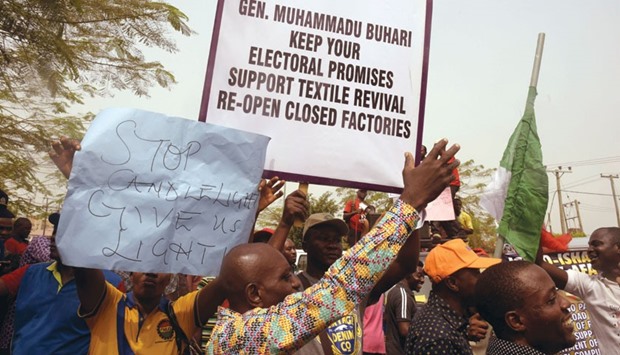
Protestors hold placards during a demonstration in Lagos yesterday over the 45% hike in electricity prices.
Thousands of Nigerian workers took to the streets yesterday to protest against a 45% increase in electricity prices that they say will hit the country’s poorest.
The protest, organised by the nation’s two main labour bodies the Nigeria Labour Congress and Trade Union Congress, is seen as the first challenge to President Muhammadu Buhari’s economic policies since he took office.
In the capital Abuja, marchers chanting slogans and holding placards such as “No to anti-poor economic policies” marched to the National Assembly after picketing offices of the local state energy company and regulator. There were similar demonstrations in the commercial capital, Lagos.
NLC president Ayuba Wabba said the protesters were disappointed with the National Electricity Regulatory Commission and accused it of colluding with power generation and distribution companies.
“In this very hard economic situation, it is difficult for Nigerians to swallow this very bitter pill... these tariffs should be halted,” he told Senate president Bukola Saraki in a meeting.
Power Minister Babatunde Fashola said last week the increase in tariffs was aimed at improving power supply in Nigeria, which has for decades struggled to keep the lights on.
“The surest way not to have power is to oppose the implementation of this tariff order,” he told parliament.
Electricity generation last week attained a record 5,074 megawatts - a vast improvement but still woefully short to supply the needs of more than 170mn people in Africa’s most populous nation.
Over the last decade, power supply had hovered between 1,500 and 3,500 megawatts a day, forcing most homes and businesses to rely on expensive and diesel-hungry generators.
Corruption and mismanagement have long dogged successive Nigerian governments’ ability to improve supply but the price hike comes at time of economic hardship for Africa’s number one oil producer.
The slump in global oil prices has significantly reduced government revenues, weakening the naira currency and forcing up inflation, putting much-needed infrastructure projects on hold.
The resulting increase in cost of living has left many Nigerians struggling to cope.
